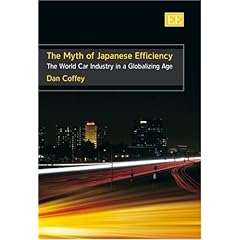 Driving on the wrong side of the road — the myth of Japanese efficiency in car manufacturing
Driving on the wrong side of the road — the myth of Japanese efficiency in car manufacturing
A new book is out attacking Lean. Or maybe the book is actually attacking “L.A.M.E.”, or “Lean as Misguidedly Executed” at Rover. This is Rover, the car company that failed and went out of business in 2005 after earlier being taken over by BMW. This is not the Range Rover brand, that was purchased by Ford from Rover previously. Ford also then bought the Rover name and intellectual property after their failure. It sounds like the company had a number of long-standing marketing and quality problems in their attempts to compete with Jaguar, BMW, Mercedes, and the like.
The book, The Myth of Japanese Efficiency by Dan Coffey, says the “just-in-time” supply system at Rover destroyed its manufacturing flexibility, increased its production costs, and fueled hostility within its factories towards its marketing plans. Its publication will reopen the debate over the collapse of Rover just as car production resumes at its Longbridge factory under Chinese ownership.
The findings are based on the author's extensive field research including independent and detailed participative research carried out within Rover Group itself.
“Lean” shouldn't decrease flexibility. Toyota plants are incredibly flexible, as the BBC also wrote about.
Lean shouldn't increase production costs. Toyota is a low cost producer, which leads to very high profits.
The researcher did “extensive” research within the Rover Group. Does that mean this book is helpful only for those within Rover? Or is there something transferable to those outside?
Without reading the book (it's $100, so it's not a high priority purchase for me), it's hard to see what conclusions the authors are drawing. Is it a problem with HOW Lean was implemented at Rover or does it highlight problems inherent to Lean?
I'd guess it's the former (HOW “lean” was implemented). Too many of us have had first hand experience with successful Lean implementations to want to blame Lean for Rover's problems. We also know that Lean Failures are far too common, even the most vocal Lean proponents (such as Jeff Liker) will admit that.
The book isn't just trying to point out what went wrong at Rover, they are trying to expose a “myth” of Lean production. It's hard to understand how somebody can take something very visible and call it a myth. Toyota is measurably more successful than the rest of the automakers, including the Detroit Three. Toyota does things measurably different and manages people in a different way. This is a “myth?”
I don't have a problem with people questioning Lean practices, but I do have a problem with people calling Lean a “myth.” This isn't Bigfoot we're talking about, it's a proven management and process improvement methodology that has been very successful outside of Toyota and outside of automotive manufacturing (and outside of manufacturing!)
The book will force academics to review the findings of the 1989 Massachusetts Institute of Technology (MIT) survey of the global car industry, which gave birth in the first instance to the notion of ‘lean production'.
The MIT survey found Japanese plants enjoyed much higher labour productivity advantages than could be explained by investment in automation.
Dr Coffey shows the methodology for this revered research project was flawed both because of how the data was interpreted statistically and because it omitted overtime work in the index of labour used.
As a real-world Lean practitioner, I could honestly care less that “academics” might have to re-think Lean. The Lean cow is out of the barn, it's been proven in the real world.
I emailed Jim Womack and asked him about this book. Jim had heard of the book, but didn't know any details about the case it was making. I then asked Jim about the claim of omitting overtime data and I haven't heard back from him yet.
As Japanese imports made significant in-roads into Western markets in the 1970s and 1980s, this was more easily explained by finding a fictional manufacturing revolution.
This really makes me wonder if the researchers visited Toyota, to compare Rover and Toyota, or if they visited any sites of Lean success stories. This is not a “fictional” revolution. That sounds like the excuse-making talk of people who failed in their lean implementation and the researchers who parroted their claims.
The book has received praise from academic experts from across the world. Writing from the world-leading Stanford University in the US, Professor Sarah S. Lochlann Jain describes the book as “of exceedingly high calibre” and predicts it will make a “critical contribution to the literature on the automobile industry”.
I'm not sure professor Jain knows about manufacturing or Lean. She's a cultural anthropology professor. Now, Jim Womack was a Political Scientist, but it's easy to argue he has made quite an effort to learn about manufacturing. I'm not sure if Professor Jain did anything other than read the “Myth” book.
The book's table of contents includes:
- Introducing the Myth of Japanese Efficiency
- Wide Selection / a Myth Encountered
- Production Malapropisms: the BMW-Rover Group Controversy
- Lean Production: the Dog That Did Not Bark
- Back to the Future – the Reorganization of Work at Toyota
- Rivalrous Asymmetries and the Japanese Myth
- Rethinking Lean Thinking: Substance and Counterfeit
- The Totalising Myth: Japanese Efficiency as a Cultural Fiction
Fair and balanced? If someone has $100 to throw around and wants to read this book, please report back to us.
Please scroll down (or click) to post a comment. Connect with me on LinkedIn.
Let’s build a culture of continuous improvement and psychological safety—together. If you're a leader aiming for lasting change (not just more projects), I help organizations:
- Engage people at all levels in sustainable improvement
- Shift from fear of mistakes to learning from them
- Apply Lean thinking in practical, people-centered ways
Interested in coaching or a keynote talk? Let’s talk.
Join me for a Lean Healthcare Accelerator Trip to Japan! Learn More










Mark,
Excellent post. Though I haven’t read the book either ($100? Maybe we need a lean price break.), denying the effectiveness of lean seems a bit odd. Unlike a controlled experiment, there’s always going to be a fudge factor when dealing with something like a lean transformation: too many people, too many variables.
I’m guessing that the issue is with the way lean was implemented (or more accurately, *not* implemented), rather than with the underlying principles.
$100, eh? Ummm I think I will pass on this one.
Not the first of it’s kind, either. See “Just Another Car Factory?” about the “failure” of lean at the CAMI plant in Ontario and the recently released “Notes From Toyota-Land” which states that there is no such thing as the Toyota Production System and that Toyota runs unsafe sweat shops where workers are intimidated into producing. There are always going to be detractors. Until recently, the attitude among many lean practitioners seemed to be one of “ignore them and they will go away” rather than exposure. Thank you for your post, Mark.
I think we have to see what detractors are saying. We should also evaluate what they are criticizing. Toyota, the company? Lean, the system? The way a particular company or management implemented what they called “lean?” We can learn from all of these things.
While my goal is to promote lean/TPS, my objective isn’t to promote the idea that Toyota is perfect or can’t be questioned or challenged.
I certainly encourage people to challenge Toyota/TPS/lean practices. I don’t want my clients (or others) accepting lean/TPS methods “because I say so.”
I just wanted to let readers here know that Jim Womack and Dan Jones will have a thoughtful and thorough response but we haven’t seen the book yet. I’ve ordered copies; we didn’t get any advance ones.
I did see the news release. A main assertion that doesn’t make sense is the claim that the methodology in Machine was flawed. That means 90 plant managers worldwide who participated in the study had to have missed any flaw as well. I also got the impression that the books lumps Toyota and all Japanese car manufacturers together in its critique of “lean.” Stay tuned.
Sincerely,
Chet
Chet Marchwinski
Communications Director
Lean Enterprise Institute
Comments are closed.